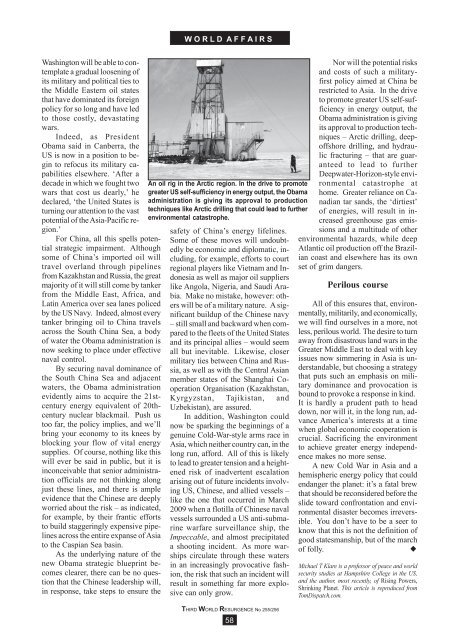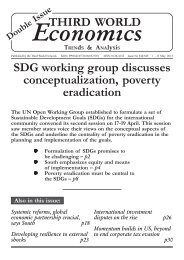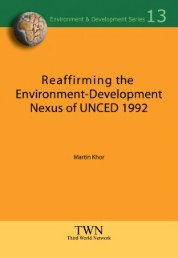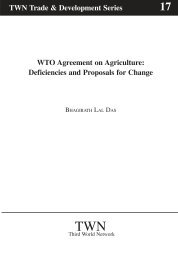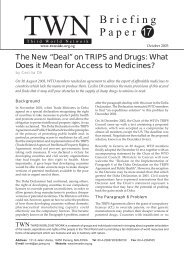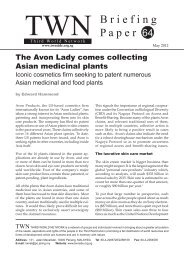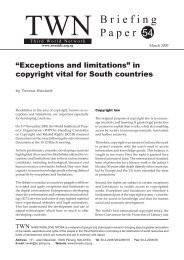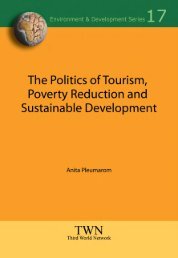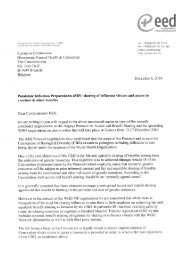Download - Third World Network
Download - Third World Network
Download - Third World Network
You also want an ePaper? Increase the reach of your titles
YUMPU automatically turns print PDFs into web optimized ePapers that Google loves.
W O R L D A F F A I R S<br />
Washington will be able to contemplate<br />
a gradual loosening of<br />
its military and political ties to<br />
the Middle Eastern oil states<br />
that have dominated its foreign<br />
policy for so long and have led<br />
to those costly, devastating<br />
wars.<br />
Indeed, as President<br />
Obama said in Canberra, the<br />
US is now in a position to begin<br />
to refocus its military capabilities<br />
elsewhere. ‘After a<br />
decade in which we fought two<br />
wars that cost us dearly,’ he<br />
declared, ‘the United States is<br />
turning our attention to the vast<br />
potential of the Asia-Pacific region.’<br />
For China, all this spells potential<br />
strategic impairment. Although<br />
some of China’s imported oil will<br />
travel overland through pipelines<br />
from Kazakhstan and Russia, the great<br />
majority of it will still come by tanker<br />
from the Middle East, Africa, and<br />
Latin America over sea lanes policed<br />
by the US Navy. Indeed, almost every<br />
tanker bringing oil to China travels<br />
across the South China Sea, a body<br />
of water the Obama administration is<br />
now seeking to place under effective<br />
naval control.<br />
By securing naval dominance of<br />
the South China Sea and adjacent<br />
waters, the Obama administration<br />
evidently aims to acquire the 21stcentury<br />
energy equivalent of 20thcentury<br />
nuclear blackmail. Push us<br />
too far, the policy implies, and we’ll<br />
bring your economy to its knees by<br />
blocking your flow of vital energy<br />
supplies. Of course, nothing like this<br />
will ever be said in public, but it is<br />
inconceivable that senior administration<br />
officials are not thinking along<br />
just these lines, and there is ample<br />
evidence that the Chinese are deeply<br />
worried about the risk – as indicated,<br />
for example, by their frantic efforts<br />
to build staggeringly expensive pipelines<br />
across the entire expanse of Asia<br />
to the Caspian Sea basin.<br />
As the underlying nature of the<br />
new Obama strategic blueprint becomes<br />
clearer, there can be no question<br />
that the Chinese leadership will,<br />
in response, take steps to ensure the<br />
An oil rig in the Arctic region. In the drive to promote<br />
greater US self-sufficiency in energy output, the Obama<br />
administration is giving its approval to production<br />
techniques like Arctic drilling that could lead to further<br />
environmental catastrophe.<br />
safety of China’s energy lifelines.<br />
Some of these moves will undoubtedly<br />
be economic and diplomatic, including,<br />
for example, efforts to court<br />
regional players like Vietnam and Indonesia<br />
as well as major oil suppliers<br />
like Angola, Nigeria, and Saudi Arabia.<br />
Make no mistake, however: others<br />
will be of a military nature. A significant<br />
buildup of the Chinese navy<br />
– still small and backward when compared<br />
to the fleets of the United States<br />
and its principal allies – would seem<br />
all but inevitable. Likewise, closer<br />
military ties between China and Russia,<br />
as well as with the Central Asian<br />
member states of the Shanghai Cooperation<br />
Organisation (Kazakhstan,<br />
Kyrgyzstan, Tajikistan, and<br />
Uzbekistan), are assured.<br />
In addition, Washington could<br />
now be sparking the beginnings of a<br />
genuine Cold-War-style arms race in<br />
Asia, which neither country can, in the<br />
long run, afford. All of this is likely<br />
to lead to greater tension and a heightened<br />
risk of inadvertent escalation<br />
arising out of future incidents involving<br />
US, Chinese, and allied vessels –<br />
like the one that occurred in March<br />
2009 when a flotilla of Chinese naval<br />
vessels surrounded a US anti-submarine<br />
warfare surveillance ship, the<br />
Impeccable, and almost precipitated<br />
a shooting incident. As more warships<br />
circulate through these waters<br />
in an increasingly provocative fashion,<br />
the risk that such an incident will<br />
result in something far more explosive<br />
can only grow.<br />
THIRD WORLD RESURGENCE No 255/256<br />
58<br />
Nor will the potential risks<br />
and costs of such a militaryfirst<br />
policy aimed at China be<br />
restricted to Asia. In the drive<br />
to promote greater US self-sufficiency<br />
in energy output, the<br />
Obama administration is giving<br />
its approval to production techniques<br />
– Arctic drilling, deepoffshore<br />
drilling, and hydraulic<br />
fracturing – that are guaranteed<br />
to lead to further<br />
Deepwater-Horizon-style environmental<br />
catastrophe at<br />
home. Greater reliance on Canadian<br />
tar sands, the ‘dirtiest’<br />
of energies, will result in increased<br />
greenhouse gas emissions<br />
and a multitude of other<br />
environmental hazards, while deep<br />
Atlantic oil production off the Brazilian<br />
coast and elsewhere has its own<br />
set of grim dangers.<br />
Perilous course<br />
All of this ensures that, environmentally,<br />
militarily, and economically,<br />
we will find ourselves in a more, not<br />
less, perilous world. The desire to turn<br />
away from disastrous land wars in the<br />
Greater Middle East to deal with key<br />
issues now simmering in Asia is understandable,<br />
but choosing a strategy<br />
that puts such an emphasis on military<br />
dominance and provocation is<br />
bound to provoke a response in kind.<br />
It is hardly a prudent path to head<br />
down, nor will it, in the long run, advance<br />
America’s interests at a time<br />
when global economic cooperation is<br />
crucial. Sacrificing the environment<br />
to achieve greater energy independence<br />
makes no more sense.<br />
A new Cold War in Asia and a<br />
hemispheric energy policy that could<br />
endanger the planet: it’s a fatal brew<br />
that should be reconsidered before the<br />
slide toward confrontation and environmental<br />
disaster becomes irreversible.<br />
You don’t have to be a seer to<br />
know that this is not the definition of<br />
good statesmanship, but of the march<br />
of folly.<br />
ÿu<br />
Michael T Klare is a professor of peace and world<br />
security studies at Hampshire College in the US,<br />
and the author, most recently, of Rising Powers,<br />
Shrinking Planet. This article is reproduced from<br />
TomDispatch.com.


